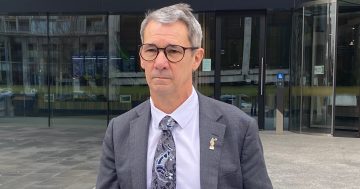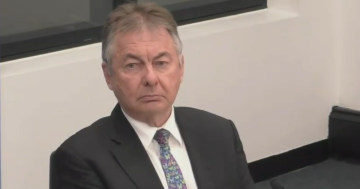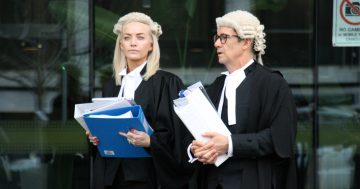
Chief Minister Andrew Barr (left) stated the government was considering its options around Walter Sofronoff’s decision to leak aspects of the inquiry to certain media. Photo: Claire Fenwicke.
The conduct of Board of Inquiry chair Walter Sofronoff KC is now under question following the early release of his report to select media outlets without the ACT Government’s knowledge.
It’s also been revealed Mr Sofronoff was briefing certain journalists before each hearing day of the Board of Inquiry into the ACT’s criminal justice systems, again without the government’s knowledge.
The ACT Government released the full report, including adverse comments in the appendices, on Monday (7 August).
Mr Sofronoff had completed an interim report, but he did remove some of his recommendations and comments from the final report following submissions from those impacted.
This final report is the one the government has released.
Chief Minister Andrew Barr said he had found out Mr Sofronoff had chosen to provide the report – including to one journalist before it was even in the government’s hands – to two media outlets under embargo, which he said was a “significant lapse of judgement”.
“This action, and the reporting that has followed, has interfered with the due process that should have been afforded to impacted parties,” he said.
“This [inquiry] should have drawn a line under this matter, unfortunately, while the recommendations I believe are sound … the whole process – the leaking, the engagement with journalists on the way through – leaves in the minds of many people questions, significant questions, and it is just so disappointing.”
When the government sought an explanation, Mr Sofronoff explained he had given advance copies of his report to two journalists under “express confidence by them” that they would not publish anything until the government had published the report.
“[Mr Sofronoff] concluded [through previous experience] ‘it was possible to identify journalists who are ethical and who understand the importance of their role in the conduct of a public inquiry’,” Mr Barr said.
“He judged [the chosen journalists] ‘would not take the serious step of betraying his trust’.”
Mr Barr said the government was seeking advice about whether the premature release of the Sofronoff inquiry report constituted a breach of the Inquiries Act 1991.
“I think there’s a degree of objectivity that is required in assessing whether this constitutes a breach, an interpreting or reasonably straight reading of Section 17 of the Act would clearly indicate that it is,” he said.
“Whether there are any mitigating circumstances remains to be seen.”
It’s also possible the entire matter could be referred to the ACT Integrity Commission.
Despite the concerns around Mr Sofronoff’s conduct, Mr Barr stressed the government did have confidence in his 10 recommendations.
“Our focus remains on implementation … the recommendations in the report provide practical ways that the government, and [the other] institutions [involved] can ensure that the matters raised in the trial do not occur in the future,” he said.
“As the Board of Inquiry report arose from concerns that a fair procedural process was not followed in the trial, our intention was to ensure the release of the report was handled appropriately.”
Attorney-General Shane Rattenbury said the government would work with the Office of the DPP and police in implementing some of the 10 recommendations.
“I want to assure the ACT public that they can have confidence in the ACT justice system,” he said.
“The report did not uncover fundamental or grievous problems with the justice system here in the Territory. It found instances of poor individual behaviour and poor choices, compounded by a heightened media and political environment.
“That said, I also acknowledge the view that the justice system in the ACT fails to address survivors’ needs for healing and justice.”
Many of the recommendations were aimed at police, including developing a clear “threshold to charge” and how it’s applied to evidence, developing a more consistent approach to the compiling of briefs of evidence, creating disclosure certificates to clearly identify documents, and more training.
It was also recommended legislation be brought in to define the scope and content of material to be disclosed by the prosecution in criminal proceedings, and to updating the process of recording retrial decisions.
“I think it’s probably fair to reflect that for both [the prosecutions office and police] this has been a wake-up call,” Mr Rattenbury said.
“I think it puts them both on notice that they need to work through this and they need to resolve these issues.”
Mr Drumgold will remain on leave until his personal leave is up on 1 September.
Acting DPP Anthony Williamson SC will continue in the role over the coming months until a permanent DPP is found.
Mr Rattenbury said the government was still considering whether it would charge Mr Drumgold over the findings he had misled the ACT Supreme Court.
“I have written to Mr Drumgold inviting him to make a response … before the government takes a final decision,” he said.
The ACT Bar Association has been awaiting the release of the report, and is considering whether Mr Drumgold will be able to continue practising law in the Territory.
















